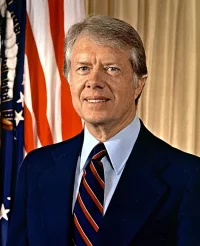
In the late 1970’s, in the wake of the Iranian Revolution and the ongoing hostage crisis, a massive oil shortage swept across the nation. For the first time in decades, lines formed at convenience stores and gas stations as people desperately tried to fill their cars with gas. In the midst of what called a “crisis of confidence,” President Carter addressed the nation July 15, 1979 in what later became known as the “malaise” speech. Ambassador Alfred Moses was Special Advisor and Special Counsel to President Carter from 1980-81 and later served as Ambassador to Romania under President Clinton. Ambassador Robert Strauss was U.S. Trade Representative and then Special Representative to the Middle East under President Carter and later served as head of the Democratic National Convention and as Ambassador to Russia. They were both interviewed by Charles Stuart Kennedy, in 2005 and 2002 respectively.
Carter was “too preachy and glum”
Alfred Moses
MOSES: As President, he was not as effective as he should have been. I tried to change things, to give him a sense of how to project himself politically, exuding confidence and power. He lost this after our embassy staff in Tehran was seized. I spoke with him about core Democratic Party issues, but at heart he was a populist. He attacked lawyers, accountants, professional people generally, exalting the mythical, primordial man, right out of Rousseau. The American public did not want to listen; he was too preachy, too glum. In fact, he was a much better president than George W. Bush, but Bush went around the country in 2004 walking and talking as though he were running the world and on top of everything. The American public re-elected him, even though he doesn’t have half the candle power that Carter had. Jimmy Carter went around in a mental slouch. He had given his malaise speech in July of ’79.

It turned everybody off. It was a ridiculous speech. Jody Powell put him up to it. [Vice-President] Fritz [Mondale] was incensed by the predictable political suicide. The speech was just dreadful. He wanted to re-energize the country; he thought the country was drifting. This and the hostage-taking killed his presidency. He became the hostage in Tehran but not George W. Bush in Iraq. “No stepping back from terrorists; hit them every chance you can,” is his theme song, and he sold it even though the supposed imminent domestic terrorist attacks were outright lies intended for political purposes to scare the American public and make people believe Bush was protecting American families.
Carter had no sense how to portray strength and confidence. If he didn’t believe it, he couldn’t say it. It just wasn’t his style; it wasn’t his mindset.
“I thought it was a disaster”
Robert Strauss
Q: Were you involved in the time when President Carter addressed the nation with sort of a sour note about the great malaise? Could you explain what your impression of this whole thing was.
STRAUSS: I thought it was a disaster. I thought that whole thing of him asking for the resignations of members of his Cabinet and then reengaging some of them and not the others was a public relations disaster. I thought the malaise speech sounded like he wanted to blame it on something wrong with the American people, the reason we were having trouble and he was, when it was really his administration that was having trouble, not the American people. But you couldn’t control that sort of thing. I don’t think [White House Press Secretary] Jody Powell or [White House Communications Director] Gerry Rafshoon, who were his primary people in that area, could control it. It did not go well. My recollection is that [political consultant] Pat Caddell, a bright, talented fellow had a good deal to do with the speech.

To begin with, it didn’t make sense politically. I had little or nothing to do with the public side of the President and there wasn’t anything you could do. I think what brought it out is the press exaggerated the negative side of Carter. They turned sour on his Presidency and it was easy to magnify his failing and minimize what he stood for. It was easy to do. He was his own worst enemy. Remember the killer rabbit story? [when Carter was attacked by a swamp rabbit in his canoe and he was ridiculed in the press]
Q: Yes, the rabbit swimming towards his canoe, I think.
STRAUSS: And he killed him. It was a crazy story. Where that came from I’ll never know. Those sorts of things haunted him, and then, of course, you know, he had the Iranian situation that he was just distraught over, and then he got advice, after holding off a year, to plan an effort to break them out of there but they didn’t plan properly, didn’t have sufficient helicopters, didn’t go in with enough support to get it done. And that made him look terrible – terrible planning, terrible execution and a terrible result. I’ve never seen a man look any worse than Jimmy Carter looked the day that he got that news with respect to what had happened in the desert. It left the White House looking as terrible as the result, and the President never recovered from it.

We had gas lines at that time…. He had also asked me to take over the Middle East negotiations, you recall. After Camp David he had told Sadat and Begin that the three of them would remain a committee of three to implement the Camp David Accords to the extent they could. Well, Carter found out three weeks later that he couldn’t devote enough of his time to that responsibility. His phone was ringing and he spent all his time talking to them. He couldn’t be President and do that. He asked if Sadat and Begin would accept me in his place, and they said yes. So I went to the Middle East as the replacement for Carter. While I was doing that, we had a gasoline shortage and long gas lines with the election coming up, and Carter sent me over to Saudi Arabia to talk to them about trying to get more oil from them.
I’ll never forget, we had an ambassador over there who [that] was from South Carolina, former Governor John West…a very good man. He had really set the crown prince up. It was sort of like it is today. The crown prince is now the acting king because the king is ill. The then king was too ill, and the then crown prince saw me and we spent about four hours together, from 10 at night till two in the morning, which is when the Saudis like to negotiate, and he finally gave me 500,000 barrels a day for six months. That was a big story back here: “Strauss Brings Back Half a Million Barrels a Day.” Those things were all good for the President, the country and me. John West deserved the credit, but I got it.
